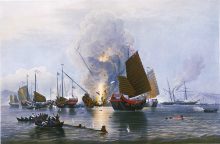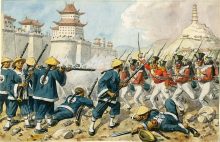Combats set the stage for the formation of Hong Kong, and the city had a rough start as the breeding ground for sins and deaths. “Why don’t you go to Hong Kong?” – an infamous slang among the soldiers in Great Britain, again echoes how warped and sordid the colony was.
All blame went to the two Opium Wars (the 1st was from 1839 to 1842; the 2nd was from 1856 to 1860). Starting in the 18th century, the British greatly relied on opium businesses in exchange for silver in order to pay for silk and tea, but they soon felt unsettled due to the diminishing gains from the strict restrictions of foreign trades imposed by the Emperor Qing. Rage even flared up in them after their right to trade in China was banned and tons of opium were destroyed by imperial commissioner Lin Zexu (林則徐), as the number of addicts alarmingly soared in China. With no surprise, the outbreak of war became inevitable when the Royal Navy was sent, and invaded Guangzhou.


Hong Kong Island was unofficially ceded to Great Britain when the Union Jack was waving in the air at Possession Point (now in Sheung Wan) on January 25, 1841, before the Treaty of Nanjing was signed a year later. It was the first ever unequal treaty that triggered Qing’s sense of shame and humiliation.
The trade center the British aspired to build was started off on the wrong foot nonetheless, as the treaty did not make the Island port exclusive by having forced China to open up 5 other ports for businesses. What followed indeed were pirates, thieves, extradited criminals, Malaria, and growing mistrust between locals and Europeans. Never did the colonial government try best to fix the problems so as to attract businesses with a safe ground.
Sometimes two wrongs make a right – things started to get better after the Taiping Rebellion in the 1850s and the 2nd Opium War. A flock of Chinese refugees escaped to Hong Kong, meaning skills and resources were also brought along; plus, the British were granted with various privileges from the Treaty of Tientsin from China’s defeat in the 2nd Opium War. The booming economy starting from the late 1850s was also thanks to the Hong Kong migrants working overseas, slowly fulfilling the greed the British had upon the Island.
Hopes dimmed for the future of Hong Kong at the start – but the colony seemed so resilient and created unimaginable possibilities amid sins and deaths, and surrounding changes.
#hkhistory #hongkongcolonialhistory #hongkonghistory #opiumwar #possessionpoint


